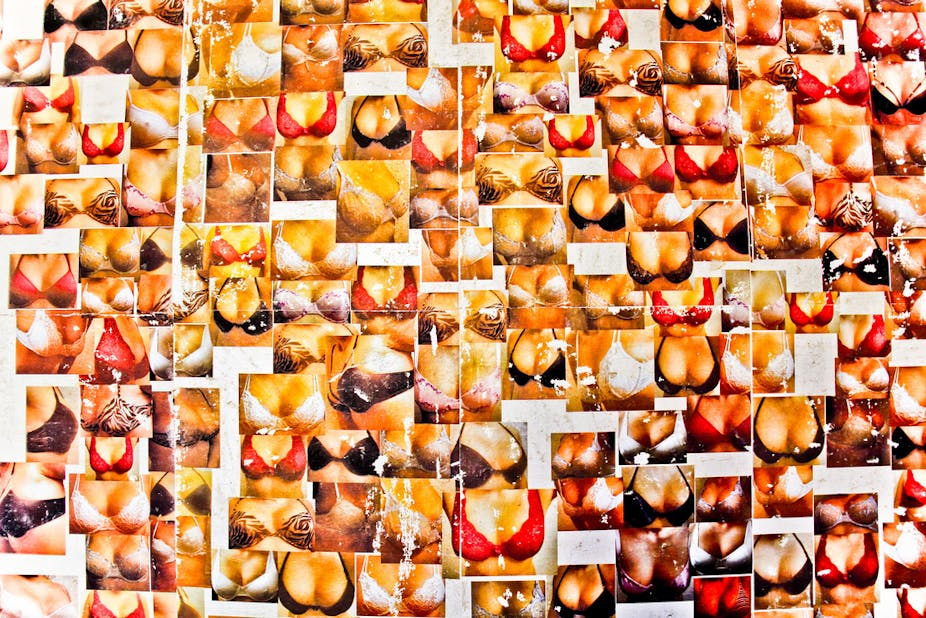Social media can help raise awareness of health issues, engaging people in discussion and encouraging them to take action. But thoughtless adherence to such trends has the potential to cause harm.
New ideas (or memes) can spread quickly on platforms such as Twitter and Facebook. Mamming is such a new meme.
Mamming is the brain child of Michelle Lamont and Michele Jaret, two young women in the advertising industry. It involves resting (clothed) female (or even male) breasts on a flat surface. Then a photo is taken and sent off to Twitter and Instagram.
If you find this description not clear enough, this video clip will show you how it’s done. Also, the thisismamming website provides further examples.
Mamming photos are tweeted to raise awareness of breast cancer, to reduce the awkwardness of mammograms, and to encourage women to participate in breast cancer screening.
Lamont and Jaret propose that “#Mamming is a chance for all* of us to show solidarity with the millions of women getting mammograms this Breast Cancer Awareness Month. Because when a woman reaches a certain age, doctors recommend that she get a mammogram to screen for the disease, and the procedure involves laying her boobs on the machine’s flat surface.”
It appears many young women, and some young men, have taken up the challenge and posted photos of their breasts on Twitter and Instagram. Several men on Twitter have greeted the new meme as a welcome distraction, while others have expressed their support for breast cancer awareness and screening.
So far, so good. But we should be careful about following this trend uncritically. Many people may not realise that breast cancer screening involves benefits as well as harms.
The Cochrane Collaboration did a systematic review of research evidence, and found that for every 2,000 women invited for screening over ten years, one will avoid dying of breast cancer. But ten healthy women, who would not have been diagnosed if there had not been screened, would be treated unnecessarily.
And more than 200 women will experience psychological distress, including anxiety and uncertainty for years because of false positive findings.
The reason why this is of particular concern is that the women who have so far embraced the mamming meme are, for the most part, young.
In Australia, breast cancer screening until recently was recommended for women aged between 50 and 69 years. But data released today shows that just over half (55%) of women in the target age group had a mammogram in 2010-2011. This age range has now been extended to 74 years.
In the United States, the American Cancer Society recommends that women start earlier, at 40, and continue to have mammograms every year.
In the United Kingdom, women aged between 50 and 70 years (soon to be between 47 and 73) are routinely invited to breast cancer screening every three years.
Lamont and Jaret told Huffington Post that they hope “mamming reminds women to get screened, and maybe makes them feel a little less awkward about putting their boobs in the mammogram machine.”
And that’s what doesn’t fit: regular breast screening is not recommended for young women, yet mamming’s purpose is to remind women to get screened. The vast majority of women portrayed on the thisismamming website look younger than 35 years of age.
What’s more, the women who keep reminding each other by sharing their mamming photos on social media appear to be young women.
Will the trend make young women feel they should have a mammogram and risk unnecessary psychological distress and interventions, such as surgery? It’s unlikely that they blindly follow every craze but, at first sight, mamming appears to be in support of a worthwhile cause.
When Kylie Minogue’s diagnosis of breast cancer became public knowledge, there was a surge of young women participating in breast cancer screening.
We can only hope this craze dies down as quickly as it emerged. In the meantime, I’ll keep tweeting with the hash tag #mamming, pointing young women to the Nordic Cochrane Centre’s mammography screening leaflet.
If you’re on Twitter, why don’t you join me in setting the picture straight.

